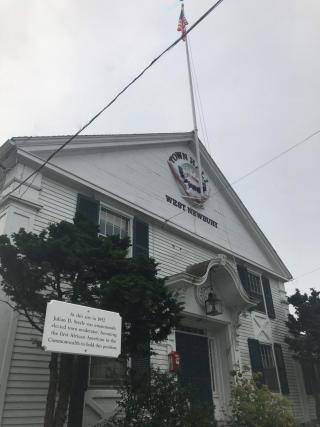WEST NEWBURY HONORS JULIAN D. STEELE

WEST NEWBURY, Mass., September 3, 2020 — Today the West Newbury Historical Commission unveiled a new historic marker located in front of Town Hall, 491 Main Street. The new marker highlights Julian D. Steele, a resident of West Newbury elected as the Commonwealth’s first Black Town Moderator in 1952. Steele was a resident of West Newbury for about 30 years, from the early 1940s to his death in 1970. This is West Newbury’s first such historic marker in at least 50 years.
Funded through the Community Preservation Committee, the idea for the historic marker for Julian Steele began in May 2019 when the Commission presented the proposal to the Board of Selectman; the new marker was then approved unanimously at the special town meeting in November, 2019. “As we shared stories of West Newbury’s historic markers for our monthly series during the Town bicentennial last year, we recognized Julian Steele held a special place in not only West Newbury’s history, but Massachusetts’ as well,” said Bob Janes, chairman of the Historical Commission. “We felt that his many accomplishments should be highlighted in our community, and decided a historic marker at the place he was elected town moderator and presided over meetings would be most fitting. We’re excited to unveil this to the public today so they can learn more about Julian Steele and his legacy.”
Steele was a civic and religious leader who championed causes like civil rights and affordable housing at state and federal levels. Born in 1906 in Savannah, Georgia, he and his family moved to Boston in about 1915, where he went on to graduate cum laude from Harvard University in 1929. After time as Executive Director of Robert Gould Shaw Settlement House in Roxbury, Mass., he was named director of the Armstrong Hemenway Foundation in Boston, which focused on affordable housing and social work. He was named President of the Boston NAACP in 1944 and also served as President of Boston’s Urban League.
Steele’s civic leadership stretched across the Commonwealth; he made history in many Town and State positions. In March 1952, Steele was unanimously elected the Town Meeting Moderator, the first Black moderator in Massachusetts. He was elected first Black Massachusetts Congregationalist Moderator, the top layman, in 1954, the same year he was named to the Massachusetts Parole Board. In 1968 he marked another first: he became the first Black state agency head when he was sworn in as Commissioner of Massachusetts Department of Community Affairs. He served as Town Moderator until he died at home in West Newbury in January 1970.
“The Massachusetts Moderators Association applauds the town of West Newbury for acknowledging the remarkable life of its former town meeting moderator, Julian Steele, and joins in honoring his outstanding contributions to local democracy,” said Steve Fors, president Massachusetts Moderators Association.
In the early 1940s Julian Steele and his wife Mary (Polly) Dawes Steele purchased a farm on Crane Neck Street in West Newbury, with the town’s country setting, as told to Ebony Magazine in 1954, the perfect environment to raise a family. In West Newbury, Steele was very active in the Congregational Church where he started a men’s study group. He also participated in summer theater at the Town Hall and was a founder and moderator of a weekly lecture series The Wide-Awake Town Hall Forum.
Residents of West Newbury have long recognized the impact Julian Steele made on the community. In a February 27, 1971 Town Meeting, Police Chief Eugene M. “Shike” Willis read a resolution on the death of Mr. Steele, in which he stated “Be It Resolved that in the passing of Julian Steele who served the Town as Moderator, the Town has lost a valuable and faithful public servant who has left an example of a life worthy of the emulation of all.”
Steele’s daughter Emilie stated, “The family of Julian Steele thanks everyone who worked so hard on the Julian Steele historical marker. We appreciate this recognition of the many contributions Julian Steele made to the town as its Moderator and as a resident. Town meetings truly are democracy in action; in honoring our father, grandfather great-grandfather West Newbury also honors the belief that all people can come together without regard to “differences.” In these difficult times we remember the words he spoke so many years ago that are still relevant today:
‘Human progress can be measured largely in terms of acceptance of difference as interesting and our common humanity as profoundly important…I am convinced we shall get through the present ‘stalemate of terror’ that exists in the world, not so much by force of arms as by the moral and spiritual forces in the universe that as yet have not been tapped.’”
More information about Julian Steele can be found in the West Newbury Historical Commission’s January 2020 Historic Minute. The location of all West Newbury’s historic markers can be found on the Town web site.

